特殊句式 课件(共67张PPT) - 2026届高考英语二轮复习
文档属性
| 名称 | 特殊句式 课件(共67张PPT) - 2026届高考英语二轮复习 |  | |
| 格式 | pptx | ||
| 文件大小 | 785.7KB | ||
| 资源类型 | 教案 | ||
| 版本资源 | 通用版 | ||
| 科目 | 英语 | ||
| 更新时间 | 2025-06-13 12:08:08 | ||
图片预览

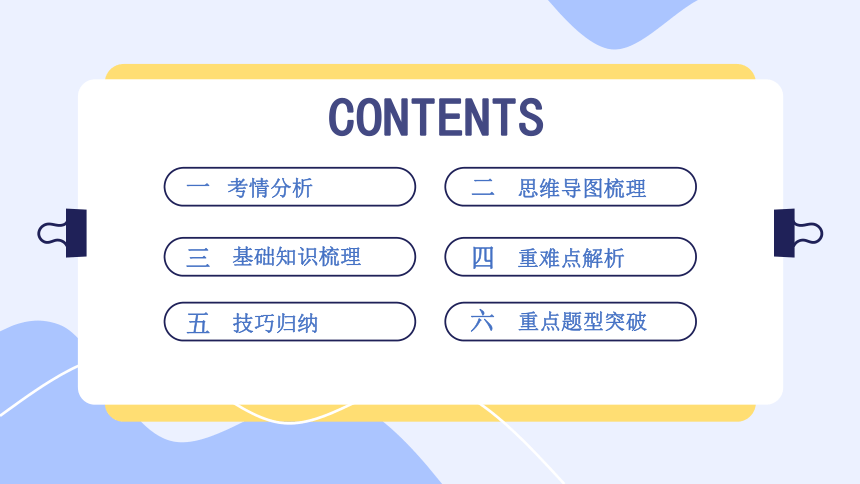

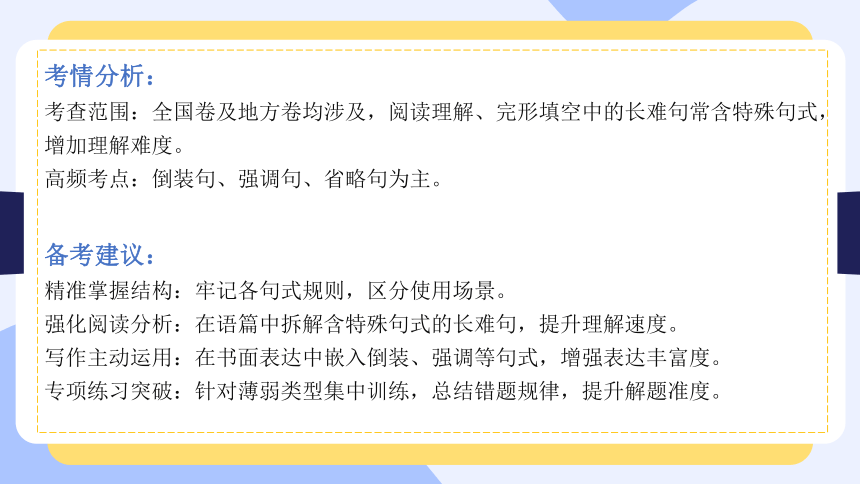

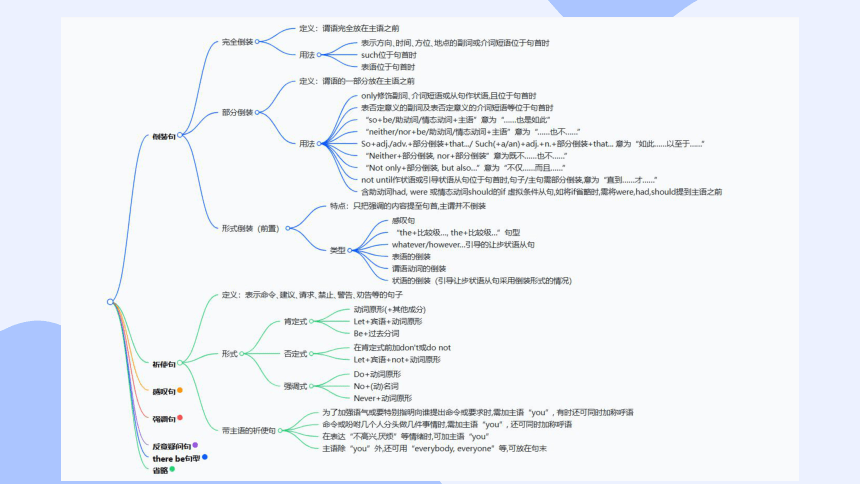
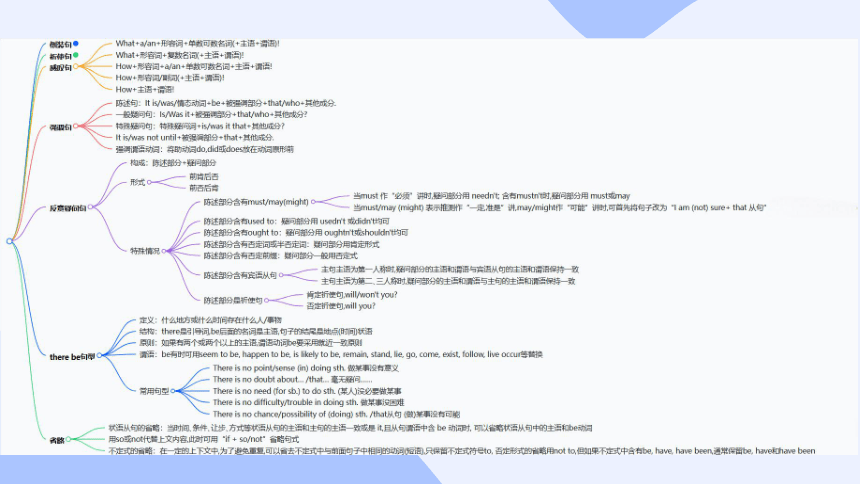

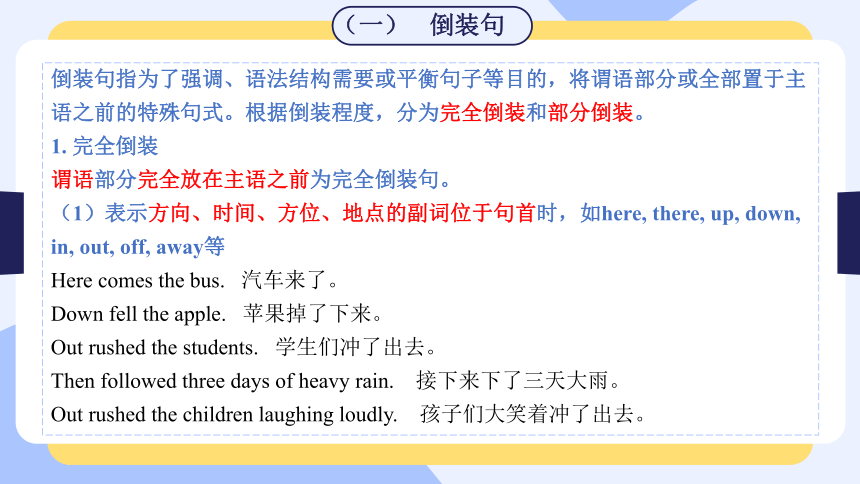
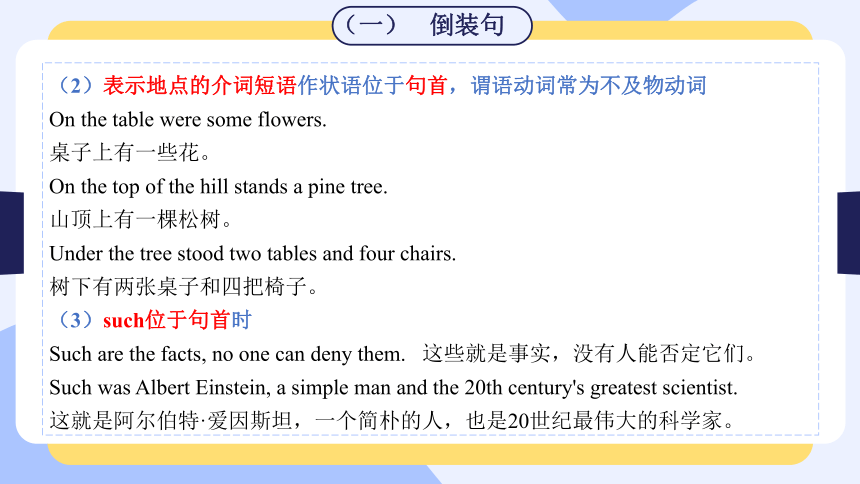
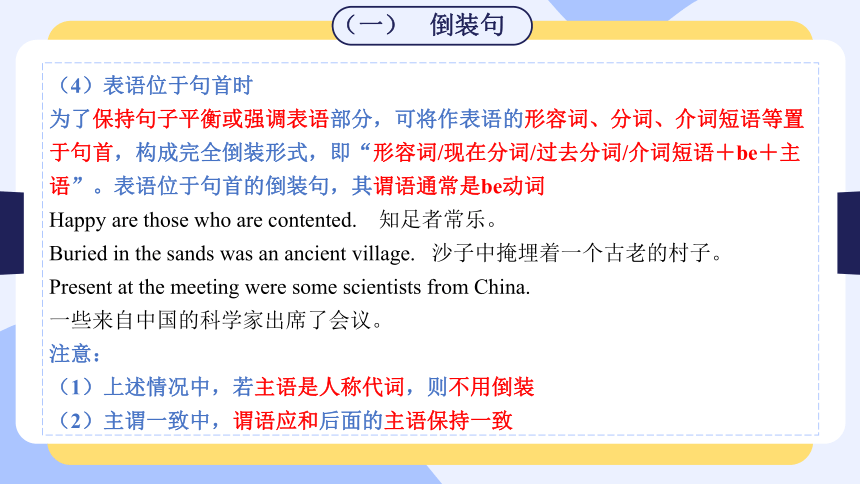
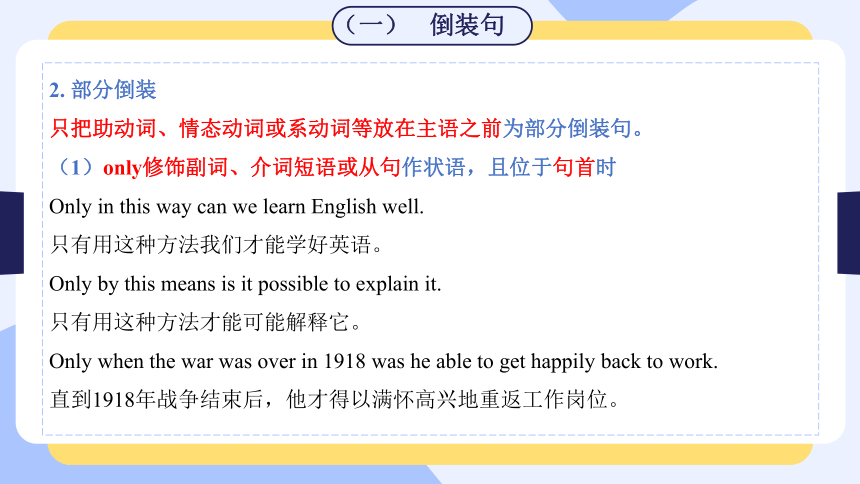
文档简介
(共67张PPT)
(10) 特殊句式
2026届高考一轮复习讲学练全攻略
考情分析
一
思维导图梳理
二
基础知识梳理
三
重难点解析
四
技巧归纳
五
重点题型突破
六
CONTENTS
一 考情分析
考情分析:
考查范围:全国卷及地方卷均涉及,阅读理解、完形填空中的长难句常含特殊句式,增加理解难度。
高频考点:倒装句、强调句、省略句为主。
备考建议:
精准掌握结构:牢记各句式规则,区分使用场景。
强化阅读分析:在语篇中拆解含特殊句式的长难句,提升理解速度。
写作主动运用:在书面表达中嵌入倒装、强调等句式,增强表达丰富度。
专项练习突破:针对薄弱类型集中训练,总结错题规律,提升解题准度。
二 思维导图梳理
三 基础知识梳理
倒装句
(一)
倒装句指为了强调、语法结构需要或平衡句子等目的,将谓语部分或全部置于主语之前的特殊句式。根据倒装程度,分为完全倒装和部分倒装。
1. 完全倒装
谓语部分完全放在主语之前为完全倒装句。
(1)表示方向、时间、方位、地点的副词位于句首时,如here, there, up, down, in, out, off, away等
Here comes the bus. 汽车来了。
Down fell the apple. 苹果掉了下来。
Out rushed the students. 学生们冲了出去。
Then followed three days of heavy rain. 接下来下了三天大雨。
Out rushed the children laughing loudly. 孩子们大笑着冲了出去。
倒装句
(一)
(2)表示地点的介词短语作状语位于句首,谓语动词常为不及物动词
On the table were some flowers.
桌子上有一些花。
On the top of the hill stands a pine tree.
山顶上有一棵松树。
Under the tree stood two tables and four chairs.
树下有两张桌子和四把椅子。
(3)such位于句首时
Such are the facts, no one can deny them. 这些就是事实,没有人能否定它们。
Such was Albert Einstein, a simple man and the 20th century's greatest scientist.
这就是阿尔伯特·爱因斯坦,一个简朴的人,也是20世纪最伟大的科学家。
倒装句
(一)
(4)表语位于句首时
为了保持句子平衡或强调表语部分,可将作表语的形容词、分词、介词短语等置于句首,构成完全倒装形式,即“形容词/现在分词/过去分词/介词短语+be+主语”。表语位于句首的倒装句,其谓语通常是be动词
Happy are those who are contented. 知足者常乐。
Buried in the sands was an ancient village. 沙子中掩埋着一个古老的村子。
Present at the meeting were some scientists from China.
一些来自中国的科学家出席了会议。
注意:
(1)上述情况中,若主语是人称代词,则不用倒装
(2)主谓一致中,谓语应和后面的主语保持一致
倒装句
(一)
2. 部分倒装
只把助动词、情态动词或系动词等放在主语之前为部分倒装句。
(1)only修饰副词、介词短语或从句作状语,且位于句首时
Only in this way can we learn English well.
只有用这种方法我们才能学好英语。
Only by this means is it possible to explain it.
只有用这种方法才能可能解释它。
Only when the war was over in 1918 was he able to get happily back to work.
直到1918年战争结束后,他才得以满怀高兴地重返工作岗位。
倒装句
(一)
(2)表否定意义的副词、连词或短语置于句首时,如not, neither, never, hardly, seldom, nor, scarcely, rarely, barely, little, no, nowhere, at no time, by no means, in no way, in no case, on no condition, under no circumstances等
Not a single mistake did he make.
他一个错误也没犯。
Never before have I seen such a moving film.
以前我从未看过这么感人的电影。
Not a single song did she sing yesterday.
昨天她一首歌也没有唱。
Hardly/Scarcely had he heard the news when he began to cry.
他一听到这个消息就哭了。
倒装句
(一)
(3)“so+be/助动词/情态动词+主语”意为“……也是如此”,表示前面所说的肯定情况也适合于另一人或物
-I've got an enormous amount of work to do. —我有大量的工作要做。
-So have I. —我也如此。
They love making lots of friends; so do I.
他们喜欢交很多朋友,我也是如此。
(4)“neither/nor+be/助动词/情态动词+主语”意为“……也不这样”,表示前面所说的否定内容也适用于另一人或物
I don't like it, neither does Tom.
我不喜欢它,汤姆也不喜欢它。
倒装句
(一)
(5)So+adj./adv.+部分倒装+that...
Such(+a/an)+adj.+n.+部分倒装+that...
To such a degree/length/...+部分倒装+that... 意为“如此……以至于……”
Such a fine day is it that we'd like to play outside.
天气如此好以至于我们想去外面玩。
To such a length did he speak that everyone got bored.
他的讲话如此冗长以至于人人都烦了。
So fast does light travel that we can hardly imagine its speed.
光速很快,我们几乎没法想象它的速度。
倒装句
(一)
(6)“Neither+部分倒装, nor+部分倒装”意为“既不……也不……”
Neither do I know it, nor do I care about it.
我不知道这件事,也不关心。
(7)“Not only+部分倒装, but also…”意为“不仅……而且……”
Not only does she speak Spanish, she's also good with computers.
她不仅会说西班牙语,还精通计算机。
Not only will help be given to people to find jobs, but also provided for people who need it.
不仅要给那些找工作的人提供帮助,而且也要给那些需要帮助的人提供药物治疗。
倒装句
(一)
(8)not until作状语或引导状语从句位于句首时,句子/主句需部分倒装,意为“直到……才……”
Not until 4: 00 in the morning could he fall asleep.
直到凌晨4点他才睡着。
Not until I came last night did Mum go to bed.
昨天晚上直到我来了妈妈才上床睡觉。
(9)某些表示祝愿的句子需部分倒装
May you succeed! 祝你成功!
Long live the People's Republic of China!
= May the People's Republic of China (should) live long!
中华人民共和国万岁!
倒装句
(一)
(10)含助动词had, were 或情态动词should的if 虚拟条件从句,如将if省略时,在if引导的非真实条件从句中,谓语动词含were, had, should,可将if省略,但需将were,had,should提到主语之前
If I were at school again, I would study harder.
→ Were I at school again, I would study harder.
如果我还有上学的机会,我会更加努力学习。
Should it not rain tomorrow, we would go for a picnic.
要是明天不下雨,我们就可以去野餐。
Had you reviewed your lessons, you might have passed the examination.
要是早复习了功课,你有可能就通过考试了。
倒装句
(一)
3. 形式倒装
形式上的倒装在语法上称为前置。它的特点是:只把强调的内容提至句首,主谓并不倒装。
(1)感叹句
What an interesting talk they had! 他们进行了一次多么有趣的谈话呀!
(2)“the+比较级…, the+比较级…”句型
The more you listen to English, the easier it becomes.
你听英语听得越多,它就变得越简单。
(3)whatever/however…引导的让步状语从句
However difficult the problem may be, we must work it out this evening.
无论这个问题会有多难,今晚我们必须解决它。
倒装句
(一)
(4)as,though引导让步状语从句采用倒装形式的情况
① 表语的倒装
Tired as/though he was, he still went on with his work.
尽管很累,他还是继续工作。
② 谓语动词的倒装
Try as he might, he didn't pass the exam.
尽管尽力了,但他考试还是不及格。
③ 状语的倒装
Much as I like it, I'll not buy it. 尽管我很喜欢它,但我不会买。
Much as he likes the bike, he doesn't want to buy it.
他虽然很喜欢那辆自行车,但不想买它。
祈使句
(二)
1. 定义
表示命令、建议、请求、禁止、警告、劝告等的句子。
2. 形式
(1)肯定式
① 动词原形(+其他成分)
Stand there!
站在那里!
② Let+宾语+动词原形
Let me have a break.
让我歇会儿。
③ Be+过去分词
Be seated, please. 请坐。
(2)否定式
① 在肯定式前加don't或do not
Don't be so sure. 别那么有把握。
Don't let him go! 别让他走!
Please don't forget to take your medicine.
请你不要忘了吃药。
② Let+宾语+not+动词原形
Let him not stand in the rain.
让他别站在雨里了。
祈使句
(二)
(3)强调式
① Do+动词原形
Do tell me the truth. 务必和我说实话。
② No+(动)名词
No parking! 禁止停车!
③ Never+动词原形
Never come late. 千万别迟到。
3. 带主语的祈使句
(1)为了加强语气或要特别指明向谁提出命令或要求时,需加主语“you”, 有时还可同时加称呼语
Tom, you water the flowers!
汤姆,你浇花!
祈使句
(二)
(2)命令或吩咐几个人分头做几件事情时,祈使句需加主语“you”, 还可同时加称呼语
You, girls, clean the desks; you, boys, sweep the floor.
你们女生,擦桌子。你们男生,打扫地板。
(3)在表达“不高兴,厌烦”等情绪时,可加主语“you”
You mind your own business!
你少管闲事!
(4)祈使句的主语除了用“you”外,还可用“everybody, everyone”等,它们可以放在句末
Be quiet, everyone!
大家静下来!
感叹句
(三)
1. what 引导的感叹句
(1)What+a/an+形容词+单数可数名词(+主语+谓语)!
What a good idea!
多好的主意啊!
What a good heart you have!
你的心肠真好!
(2)What+形容词+不可数名词/复数名词(+主语+谓语)!
What terrible news!
多么骇人听闻的消息!
What interesting stories he's told us!
他给我们讲的故事真有趣!
2. how 引导的感叹句
(1)How+形容词+a/an+单数可数名词+主语+谓语!
How clever a boy he is! 他是一个多么聪明的男孩啊!
(2)How+形容词/副词(+主语+谓语)!
How wonderful (it is)! 真棒!
How clever the boy is! 这个男孩多么聪明啊!
(3)How+主语+谓语!
How time flies! 光阴似箭!
What a clever boy he is!=How clever the boy is!=How clever a boy he is!
多聪明的男孩子啊!
What beautiful flowers they are! =How beautiful the flowers are!
多美的花啊!
感叹句
(三)
强调就是通过某种手段使句子的某一部分显得更重要
1. 陈述句
It is/was/情态动词+be+被强调部分+that/who+其他成分.
被强调部分为“人”时可用who/that,被强调部分非“人”时用that
It is I who/ that am right.
我是对的。(强调主语)
It was him that/ who we met at the school gate.
我们在学校门口遇见的是他。(强调宾语)
It was in the park that Tom lost his watch.
汤姆是在公园丢失了他的手表。(强调状语)
强调句
(四)
2. 一般疑问句
Is/Was it+被强调部分+that/who+其他成分
Was it Tom who was to blame 正是汤姆应负责任吗?
Was it in 1939 that the Second World War broke out
第二次世界大战是在1939年爆发的吗?
3. 特殊疑问句
特殊疑问词+is/was it that+其他成分
Who was it that broke the window
打破窗户的是谁?
When was it that he made up his mind to take this course
他什么时候决定选修这一课程的?
强调句
(四)
4. not… until…
It is/was not until+被强调部分+that+其他成分.
It was not until ten o'clock that he went to bed.
直到10点他才上床睡觉。
It was not until midnight that we got home because of traffic jams.
因为交通阻塞,直到半夜我们才到家。
5. 强调谓语动词
将助动词do,did或does放在动词原形前
He did write to you last week.
上周他的确给你写信了。
Tom does study hard now. 现在汤姆的确学习很努力。
强调句
(四)
注意:
(1)强调句型用于强调主语时,谓语动词与该主语在人称和数上保持一致
(2)强调谓语动词时,在该动词前加助动词do,does或did。do有时态、人称和数的变化。
Do be careful!
务必要小心!
She does love dancing!
她真的喜欢跳舞!
He did come to see you last Sunday, but you were out.
他上周日的确来看过你,但是你出去了。
强调句
(四)
反意疑问句由两部分构成:陈述部分+疑问部分。陈述部分是肯定形式时,疑问部分用否定形式,且否定形式必须为省略式;陈述部分是否定形式时,疑问部分用肯定形式,即 “前肯定、后否定;前否定,后肯定”, 疑问部分的主语要用代词。陈述部分和疑问部分的主语以及谓语动词的人称、数、时态通常要保持一致。
1. 陈述部分含有must/may(might)的反意疑问句
(1)当must 作“必须”讲时,其反意疑问部分用 needn't; 当含有mustn't(不允许,禁止)时,其反意疑问部分用 must或may。
You must go now, needn't you 你现在必须走,不是吗?
You mustn't smoke here, must/may you 你不要在这里吸烟,行吗?
反意疑问句
(五)
(2)当must/may (might) 表示推测,即must作“一定,准是”讲,may/might作“可能”讲时,可首先将句子改为“I am (not) sure+that 从句”, 反意疑问部分的动词形式根据be (not) sure 后的宾语从句的谓语动词形式确定。
You must/may (might) be hungry now, ______
→ I am sure that you are hungry now, aren't you
→ You must/may (might) be hungry now, aren't you
你现在一定/可能饿了,不是吗?
You must have watched that football match last night, ________
→ I am sure that you watched that football match last night, didn't you
→ You must have watched that football match last night, didn't you
你昨晚一定看那场足球赛了,不是吗?
(陈述部分有表示过去的时间状语 last night)
反意疑问句
(五)
2. 陈述部分含有used to的反意疑问句
陈述部分含有used to时,其反意疑问部分用 usedn't 或didn't均可。
You used to sleep with the windows open, usedn't/didn't you
你过去常开着窗户睡觉,不是吗?
3. 陈述部分含有ought to的反意疑问句
陈述部分含有 ought to时,其反意疑问部分用 oughtn't或shouldn't均可。
He ought to attend the lecture, oughtn't/shouldn't he
他应该参加这场讲座,是不是?
反意疑问句
(五)
4. 陈述部分含有否定词或半否定词的反意疑问句
当陈述部分带有seldom, hardly, scarcely, never, few, little, nothing, nobody等否定词或半否定词时,反意疑问部分用肯定形式。
He could hardly walk without a walking stick, could he
没有拐杖他几乎不能走路,是吗?
5. 陈述部分含有否定前缀的反意疑问句
如果陈述部分含有由表示“否定”意义的前缀构成的词,其反意疑问部分一般用否定式。
Tom dislikes playing tennis, doesn't he 汤姆不喜欢打网球,不是吗?
It's unfair, isn't it 那不公平,是不是?
反意疑问句
(五)
6. 陈述部分含有宾语从句的反意疑问句
(1)当陈述部分含有宾语从句时,反意疑问部分的主语和谓语应和陈述部分的主句的主语和谓语保持一致
He said that he would come to my birthday party, didn't he
他说他会来参加我的生日聚会,不是吗?
(2)当陈述部分的主句谓语动词 think, believe, suppose, guess, expect, imagine 的主语为第一人称时,反意疑问部分的主语和谓语与宾语从句的主语和谓语保持一致;若主语为第二、三人称时,反意疑问部分的主语和谓语与主句的主语和谓语保持一致。
I don't believe he will succeed, will he 我认为他不会成功,是吗?
They don't believe Jack will succeed, do they 他们不相信杰克会成功,对吗?
反意疑问句
(五)
7. 陈述部分是祈使句的反意疑问句
反意疑问句的陈述部分为祈使句时,其疑问部分不表示反意,而表示一种语气。其结构为:
否定祈使句,will you
肯定祈使句,will/won't you
Let's . . . , shall we
Let us . . . , will you
Open the door, will/won't you 打开门,好吗?
Let's go out for a walk, shall we 我们出去散步,好吗?
Let us go home now, will you 现在,(您)让我们回家吧,好吗?
反意疑问句
(五)
8. 回答反意疑问句时应遵循的原则
(1)要么肯定到底,要么否定到底,不会出现Yes, I don't. 或No, I do. 的形式。
(2)不管陈述部分为否定,还是反意疑问部分为否定,回答时只看所提到的事情是否发生。如果发生了,用肯定回答,反之,用否定回答。
You aren't a teacher, are you 或 You are a teacher, aren't you
如果你是老师,回答“Yes, I am.”
反之,回答“No, I am not.”。
反意疑问句
(五)
1. there be 句型概述
There be 句型表示“某时间/空间存在/有……”。there是引导词,本身没有词义,be动词后面的名词/代词是主语。be可以有不同的时态,可以和情态动词连用。there be结构中的动词be有时可用remain, stand, lie, go, exist, follow, live, come, occur, happen to be, appear to be, seem to be , used to be等替换
There is a big tree in front of the classroom.
教室前有棵大树。
There have been many great changes in our country since then.
从那以后,我国发生了许多巨大的变化。
Once upon a time there lived an old fisherman in a village by the sea.
从前在海边的一个村庄里住着一位老渔夫。
there be 句型
(六)
2. there be 句型的主谓一致
(1)there be句型中的谓语动词be在人称和数上应与其后的主语保持一致
There is a flower in the bottle. 瓶中有一朵花。
There are five books on the desk. 桌上有五本书。
(2)若there be句型中主语为并列结构,be的数和人称遵循就近原则
There are ten students and a teacher in the office.
办公室里有十个学生和一个老师。
There is a boy, a girl and two women in the house.
房子里有一个男孩、一个女孩和两个妇女。
There is a pen, two books, and many pencils on the desk.
桌子上有一支钢笔,两本书,还有许多铅笔。
there be 句型
(六)
3. there be 句型的时态
there be 句型有不同的时态形式,而且可以和各种助动词、情态动词连用
There was a meeting in our school yesterday.
昨天在我们学校召开了一个会议。
There will be a new film on Sunday.
星期日将上映一部新电影。
There have been many great changes in our country since then.
自那时起,我们国家发生了很多巨大的变化。
There can't be any mistakes in his passage.
他的文章里不可能有什么错误。
there be 句型
(六)
4. there be句型的谓语
there be句型中的谓语动词be有时可用seem to be, happen to be, is likely to be或用remain, stand, lie, go, come, exist, follow, live, occur等替换
There remain several issues to be decided.
还有几件事需要决定。
There is likely to be something wrong with his computer.
他的电脑可能有毛病。
Once upon a time there lived an old monk in the temple.
从前,那座庙里住着一个老和尚。
there be 句型
(六)
5. there be 句型的非谓语形式
there be 结构的非谓语动词形式是there to be 和there being 两种形式。在句中作主语、宾语和状语
I expect there to be no argument about this.
我希望在这方面不会有任何争论。
There being another chance, he will try his best.
假如再有一次机会,他会尽力而为。
I never dreamed of there being any good chance for me.
我从没想过会有什么好机会。
there be 句型
(六)
There being no enough time left, we have to hurry.
(Because there is no enough time left)
所剩时间不够多了,我们得抓紧。(独立主格结构作状语)
There having been no water for two days, the travelers were all very thirsty.
(Because there had been no water for two days)
已经断水两天了,这些游客都口渴得很厉害。(独立主格结构作状语)
What is the chance of there being an election this year
今年举行选举的可能性有多大?(there be的动名词形式作of的宾语)
I expect there to be many chances for him to get a job.
我希望他有很多机会找到工作。(there be的不定式结构作expect的宾语)
there be 句型
(六)
6. there be 的常用句型
There is no point/sense (in) doing sth. 做某事没有意义
There is no doubt about… /that… 毫无疑问……
There is no need (for sb.) to do sth. (某人)没必要做某事
There is no difficulty/trouble in doing sth. 做某事没困难
There is no chance/possibility of (doing) sth. /that从句(做)某事没有可能
There is no need for any further instructions on my part
我没有必要再作进一步的指导。
There is no point in using a soon to be outdated technology.
使用一项马上就要过时的技术毫无意义。
there be 句型
(六)
1. 主语的省略
祈使句一般省略主语
(It)Don't give up. 不要放弃。
(I)Wish you were here. 如果你在这就好了。
2. 从句的省略
(1)当时间、条件、让步、方式等状语从句的主语和主句的主语一致或是it,且从句谓语中含 be 动词时,可以省略状语从句中的主语和be动词
Don't speak until (you are) spoken to.
有人和你说话时你再说。
Come tomorrow if (it is) possible.
如果可能的话,就明天来吧。
省略句
(七)
Work hard when (you are) young, or you'll regret.
少壮不努力,老大徒伤悲。
While walking along the street, I heard my name called.
走在大街上时,我听见有人叫我的名字。
She stood at the gate as if (she was) waiting for someone.
她站在门口好像在等人。
(2)用so或not代替上文内容,此时可用“if + so/not”省略句式
Get up early tomorrow. If not (=If you don't get up early), you will miss the first bus.
明天要早起。如果你不早起,你就赶不上首班公共汽车。
He may not be at home. If so (=If he is not at home then), leave him a note.
那时他可能不在家。如果他不在家的话,给他留个便条。
省略句
(七)
(3)I'm afraid, I think, I believe, I hope, I guess等作答句,后面跟so与not分别相当于肯定或否定,宾语从句可省去
-Do you think it will rain
你认为会下雨吗?
-I hope not/that it will not rain.
我希望不要下。
-Do you believe our team will win
你相信我们队会赢吗?
-I guess so.
我猜会赢。
省略句
(七)
3. 不定式的省略
在一定的上下文中,为了避免重复,可以省去不定式中与前面句子中相同的动词(短语),只保留不定式符号to,否定形式的省略用not to
I asked him to see the film, but he didn't want to.
我叫他看电影,但是他不想看。
I'll go to her birthday party if she invites me to.
如果她邀请我参加她的生日聚会,我会去。
The driver wanted to park his car by the roadside but was asked by the police not to.
那位司机想把车停在路边,但警察不让他那样做。
省略句
(七)
(1)如果不定式中含有be, have, have been,通常保留be, have和have been,而把其余部分省略
-Are you a student
-No, but I used to be (a college student).
——你是大学生吗?
——不,但我曾经是。
(2)当主语部分含有动词do的某种形式时,作表语的不定式可省略to
The only thing you have to do is press the button.
你唯一要做的事情就是按按钮。
省略句
(七)
(3)不定式作介词but, except的宾语,前面有实义动词do的某种形式时,不定式常省略to
I had nothing to do but wait here this afternoon.
今天下午我除了在这等待无事可做。
(4)在see, watch, hear, feel, observe, notice, look at, listen to等感官动词及使役动词let, make, have后作宾语补足语的不定式不加to,但当宾语补足语变为主语补足语时,不定式要加上to
He had two boys wash his car.
他让两个男孩给他洗车。
She saw him walk into the house. 她看到他走进了那座房子。
省略句
(七)
(5)当两个或两个以上的不定式并列时,后面的不定式符号to可省略,但表示对比关系时则不能省略
I'm really puzzled what to think of and express.
我真的不知道想什么和表达什么。
It is easier to make a plan than to carry it out.
制订计划比执行计划容易。
(6)you'd better/why not后跟不带to的不定式
Why not try it again
为什么不再试试?
You'd better get up early when you want to keep up with others.
当你想追赶他人时,你最好起得早些。
省略句
(七)
4. 特殊的省略结构:常作为插入语来处理
if so 如果这样的话 if not 若非如此
if any 如果有的话 if ever 如果曾经有的话
if possible 如果可能的话
if necessary 如果有必要的话
as before/usual 像以前/寻常一样
as soon as possible 尽快
If possible, let me know in advance.
如有可能,事先通知我。
Whenever (it is) possible, he will come to my help.
他会在任何可能的时候来帮助我。
省略句
(七)
四 重难点解析
倒装句:
完全倒装:地点 / 时间副词、介词短语、表语置句首→谓语全倒装。
部分倒装:否定词、only + 状语等→助动词 / 情态动词提前。
祈使句:
肯定式(动词原形)、否定式(Don’t + 原形)、强调式(Do + 原形);带主语用法。
感叹句:What 修饰名词,How 修饰形容词 / 副词,区分句式结构。
强调句:基本结构(It is/was + 强调部分 + that/who);Not until 强调形式。
反义疑问句:“前肯后否、前否后肯” 规则;特殊动词(must、used to)的疑问形式。
There be 句型:表 “存在”,主谓就近一致原则。
省略句:状语从句 “主语 + be” 省略;不定式保留 to。
重点解析
(一)
倒装句:完全 / 部分倒装触发条件区分;虚拟条件句中 were/had/should 提前规则。
祈使句:与陈述句区分;Let 型否定式(Let not/Don’t let)。
感叹句:
What 与 How 混合句式;省略结构判断。
强调句:与定语从句区分(去掉 It is/was...that 后句子完整性)。
反义疑问句:含宾语从句的反义规则;祈使句反义形式。
There be 句型:
“存在”(there be)与 “所属”(have)区分。
省略句:否定省略(not to)、含 be/have 的省略(如 used to be);状语从句省略后逻辑主语一致性。
难点解析
(二)
五 技巧归纳
标志词速判法:
看到否定词(never/hardly/not only)、only + 状语、so/such 等,优先考虑倒装句;遇到 It is/was + 强调部分 + that/who,快速判定为强调句;句首为动词原形或 No + 动名词,直接识别为祈使句。
结构还原法:倒装句、强调句等特殊句式可还原为正常语序辅助理解。如:
倒装句 “Only when he left did I realize”→“I realized only when he left”;
强调句 “It was not until midnight that he slept”→“He did not sleep until midnight”。
主谓一致性优先:
在倒装句、there be 句型中,先确定主语位置及单复数,再匹配谓语动词。如:
完全倒装 “Here comes the bus” 中,主语为 the bus(单数),谓语用 comes;
there be 句型 “There are two books and a pen” 中,就近主语为 two books,谓语用 are。
否定与省略逻辑链:
反义疑问句中,先判断陈述部分是否含否定词 / 半否定词(no/never/few),再确定反义部分的肯否定;省略句中,牢记 “状语从句主语与主句一致 + 含 be 动词” 才可省略,避免逻辑主语混乱(如 While walking, I saw a bird vs. While walking, the bird flew away )。
写作句式升级策略:
书面表达中,合理套用特殊句式提升文采:
倒装句:Only in this way can we solve the problem;
强调句:It was your help that made me succeed;
感叹句:How meaningful the activity is!
六 重点题型突破
1. 【2024 山东 一模】—I can’t go for a holiday this summer.
—__________.
A. Neither can I B. So can I C. Nor do I D. So do I
1. A
【详解】考查部分倒装。句意:——今年夏天我不能去度假了。——我也不能。根据语境可知,第二句意思是“我也不能去”,“也不”是neither/nor,由第一句中的can’t可知,第二句中也用情态动词can,neither/nor是否定副词,位于句首时引起部分倒装,即将can提前到主语前面,因此空格处是Neither can I。故选A。
2. 【2024 山东 模拟预测】—Wang Li, what do you want to say
—______ for you.
A. A letter is here B. Here is a letter
C. A letter here is D. Here a letter is
2. B
【详解】考查倒装句。句意:——王丽,你想要说什么?——这里有你的一封信。here为副词,置于句首,句子使用完全倒装,谓语动词is放在主语a letter前面。故选B。
3. 【2025 山东 三模】— Was it Mr. Tiger _________ gave you some help when you were in trouble
— Yes. He helped me a lot.
A. whose B. whom C. when D. who
3. D
【详解】考查强调句。句意:——是Tiger先生在你遇到困难时给了你一些帮助吗?——是的。他帮了我很多。这是一个强调句的一般疑问句,其基本结构为“Was/Is it + 被强调部分 + that/who + 其他部分”。当被强调部分是人时,可以用that或who,这里被强调部分是Mr. Tiger,所以可以用who。故选D。
4. 【2024 天津 高考真题】Coffee may cause sleep disturbance, especially when _________ in large amounts or after 2 pm.
A. consumed B. being consumed C. consuming D. having consumed
4. A
【详解】考查非谓语动词。句意:咖啡可能会引起睡眠障碍,尤其是大量饮用后或在下午两点以后饮用。此处为状语从句的省略,且consume意为“吃;喝;饮用”,与句子主语 coffee构成逻辑上的动宾关系,省略be动词,故用过去分词形式。故选A。
5. 【2024 山东泰安 一模】— ________ into the night sky spelling the message “One World One Family”. We were very excited about it.
— Yeah. As a Chinese we were proud of it.
A. Up went the fireworks B. Went up the fireworks
C. Up did the fireworks go D. Up the fireworks went
5. A
【详解】考查全部倒装。句意:——烟花升入夜空,拼出“同一个世界,同一个家庭”的字样。我们对此非常兴奋。——是的。作为中国人,我们为此感到自豪。副词up放在句首,且主语the fireworks为名词,句子要用全部倒装,即:Up+谓语+主语+其他。went是本句谓语,放在主语the fireworks前。故选A。
6. 【2024 山东 三模】I______ come here yesterday. I just stood here.
A. do B. does C. did D. done
6. C
【详解】考查谓语动词的强调。句意:我昨天确实来这里了。我只是站在这儿。分析句意可知,此处考查使用助动词对谓语动词come“到来”加以强调,结合时间状语yesterday可知句子时态是一般过去时,使用“助动词did+动词原形”对谓语动词进行强调。故选C项。
7. 【2024 山东 模拟预测】—Was it in 2003 ______ the Chinese astronaut succeeded in landing on the moon
—Yes. We ______ be proud of it then.
A. when; do B. that; do C. which; did D. that; did
7. D
【详解】考查强调句型与助动词对动作的强调。——中国宇航员成功登月是在2003年吗?
——是的。我们当时确实为此感到自豪。第一空为强调句型,强调的是时间in 2003,所以用that引导。第二空是对谓语进行强调,表示对动作强调用助动词do、does或者did+动词原形;此处描述的是过去的事情,所以用did。故选D。
8. 【2025 天津 模拟预测】Since ______ last summer, the animated film Ne Zha 2 has not only shattered box-office records but also sparked heated discussions about its innovative storytelling.
A. having been released B. to be released C. released D. releasing
8. C
【详解】考查非谓语动词。句意:自去年夏天上映以来,动画电影《哪吒2》不仅打破了票房纪录,还引发了关于其创新叙事的热烈讨论。此处为since引导的时间状语从句中的省略,从句主语the animated film Ne Zha 2和从句谓语动词release是被动关系,谓语动词release用be done形式,从句中的主语与主句主语一致,且从句谓语动词中含有be动词时,可以省略“从句主语+be”,所以此处为过去分词released作状语,省略了“the animated film was”。故选C项。
See you next class!
(10) 特殊句式
2026届高考一轮复习讲学练全攻略
考情分析
一
思维导图梳理
二
基础知识梳理
三
重难点解析
四
技巧归纳
五
重点题型突破
六
CONTENTS
一 考情分析
考情分析:
考查范围:全国卷及地方卷均涉及,阅读理解、完形填空中的长难句常含特殊句式,增加理解难度。
高频考点:倒装句、强调句、省略句为主。
备考建议:
精准掌握结构:牢记各句式规则,区分使用场景。
强化阅读分析:在语篇中拆解含特殊句式的长难句,提升理解速度。
写作主动运用:在书面表达中嵌入倒装、强调等句式,增强表达丰富度。
专项练习突破:针对薄弱类型集中训练,总结错题规律,提升解题准度。
二 思维导图梳理
三 基础知识梳理
倒装句
(一)
倒装句指为了强调、语法结构需要或平衡句子等目的,将谓语部分或全部置于主语之前的特殊句式。根据倒装程度,分为完全倒装和部分倒装。
1. 完全倒装
谓语部分完全放在主语之前为完全倒装句。
(1)表示方向、时间、方位、地点的副词位于句首时,如here, there, up, down, in, out, off, away等
Here comes the bus. 汽车来了。
Down fell the apple. 苹果掉了下来。
Out rushed the students. 学生们冲了出去。
Then followed three days of heavy rain. 接下来下了三天大雨。
Out rushed the children laughing loudly. 孩子们大笑着冲了出去。
倒装句
(一)
(2)表示地点的介词短语作状语位于句首,谓语动词常为不及物动词
On the table were some flowers.
桌子上有一些花。
On the top of the hill stands a pine tree.
山顶上有一棵松树。
Under the tree stood two tables and four chairs.
树下有两张桌子和四把椅子。
(3)such位于句首时
Such are the facts, no one can deny them. 这些就是事实,没有人能否定它们。
Such was Albert Einstein, a simple man and the 20th century's greatest scientist.
这就是阿尔伯特·爱因斯坦,一个简朴的人,也是20世纪最伟大的科学家。
倒装句
(一)
(4)表语位于句首时
为了保持句子平衡或强调表语部分,可将作表语的形容词、分词、介词短语等置于句首,构成完全倒装形式,即“形容词/现在分词/过去分词/介词短语+be+主语”。表语位于句首的倒装句,其谓语通常是be动词
Happy are those who are contented. 知足者常乐。
Buried in the sands was an ancient village. 沙子中掩埋着一个古老的村子。
Present at the meeting were some scientists from China.
一些来自中国的科学家出席了会议。
注意:
(1)上述情况中,若主语是人称代词,则不用倒装
(2)主谓一致中,谓语应和后面的主语保持一致
倒装句
(一)
2. 部分倒装
只把助动词、情态动词或系动词等放在主语之前为部分倒装句。
(1)only修饰副词、介词短语或从句作状语,且位于句首时
Only in this way can we learn English well.
只有用这种方法我们才能学好英语。
Only by this means is it possible to explain it.
只有用这种方法才能可能解释它。
Only when the war was over in 1918 was he able to get happily back to work.
直到1918年战争结束后,他才得以满怀高兴地重返工作岗位。
倒装句
(一)
(2)表否定意义的副词、连词或短语置于句首时,如not, neither, never, hardly, seldom, nor, scarcely, rarely, barely, little, no, nowhere, at no time, by no means, in no way, in no case, on no condition, under no circumstances等
Not a single mistake did he make.
他一个错误也没犯。
Never before have I seen such a moving film.
以前我从未看过这么感人的电影。
Not a single song did she sing yesterday.
昨天她一首歌也没有唱。
Hardly/Scarcely had he heard the news when he began to cry.
他一听到这个消息就哭了。
倒装句
(一)
(3)“so+be/助动词/情态动词+主语”意为“……也是如此”,表示前面所说的肯定情况也适合于另一人或物
-I've got an enormous amount of work to do. —我有大量的工作要做。
-So have I. —我也如此。
They love making lots of friends; so do I.
他们喜欢交很多朋友,我也是如此。
(4)“neither/nor+be/助动词/情态动词+主语”意为“……也不这样”,表示前面所说的否定内容也适用于另一人或物
I don't like it, neither does Tom.
我不喜欢它,汤姆也不喜欢它。
倒装句
(一)
(5)So+adj./adv.+部分倒装+that...
Such(+a/an)+adj.+n.+部分倒装+that...
To such a degree/length/...+部分倒装+that... 意为“如此……以至于……”
Such a fine day is it that we'd like to play outside.
天气如此好以至于我们想去外面玩。
To such a length did he speak that everyone got bored.
他的讲话如此冗长以至于人人都烦了。
So fast does light travel that we can hardly imagine its speed.
光速很快,我们几乎没法想象它的速度。
倒装句
(一)
(6)“Neither+部分倒装, nor+部分倒装”意为“既不……也不……”
Neither do I know it, nor do I care about it.
我不知道这件事,也不关心。
(7)“Not only+部分倒装, but also…”意为“不仅……而且……”
Not only does she speak Spanish, she's also good with computers.
她不仅会说西班牙语,还精通计算机。
Not only will help be given to people to find jobs, but also provided for people who need it.
不仅要给那些找工作的人提供帮助,而且也要给那些需要帮助的人提供药物治疗。
倒装句
(一)
(8)not until作状语或引导状语从句位于句首时,句子/主句需部分倒装,意为“直到……才……”
Not until 4: 00 in the morning could he fall asleep.
直到凌晨4点他才睡着。
Not until I came last night did Mum go to bed.
昨天晚上直到我来了妈妈才上床睡觉。
(9)某些表示祝愿的句子需部分倒装
May you succeed! 祝你成功!
Long live the People's Republic of China!
= May the People's Republic of China (should) live long!
中华人民共和国万岁!
倒装句
(一)
(10)含助动词had, were 或情态动词should的if 虚拟条件从句,如将if省略时,在if引导的非真实条件从句中,谓语动词含were, had, should,可将if省略,但需将were,had,should提到主语之前
If I were at school again, I would study harder.
→ Were I at school again, I would study harder.
如果我还有上学的机会,我会更加努力学习。
Should it not rain tomorrow, we would go for a picnic.
要是明天不下雨,我们就可以去野餐。
Had you reviewed your lessons, you might have passed the examination.
要是早复习了功课,你有可能就通过考试了。
倒装句
(一)
3. 形式倒装
形式上的倒装在语法上称为前置。它的特点是:只把强调的内容提至句首,主谓并不倒装。
(1)感叹句
What an interesting talk they had! 他们进行了一次多么有趣的谈话呀!
(2)“the+比较级…, the+比较级…”句型
The more you listen to English, the easier it becomes.
你听英语听得越多,它就变得越简单。
(3)whatever/however…引导的让步状语从句
However difficult the problem may be, we must work it out this evening.
无论这个问题会有多难,今晚我们必须解决它。
倒装句
(一)
(4)as,though引导让步状语从句采用倒装形式的情况
① 表语的倒装
Tired as/though he was, he still went on with his work.
尽管很累,他还是继续工作。
② 谓语动词的倒装
Try as he might, he didn't pass the exam.
尽管尽力了,但他考试还是不及格。
③ 状语的倒装
Much as I like it, I'll not buy it. 尽管我很喜欢它,但我不会买。
Much as he likes the bike, he doesn't want to buy it.
他虽然很喜欢那辆自行车,但不想买它。
祈使句
(二)
1. 定义
表示命令、建议、请求、禁止、警告、劝告等的句子。
2. 形式
(1)肯定式
① 动词原形(+其他成分)
Stand there!
站在那里!
② Let+宾语+动词原形
Let me have a break.
让我歇会儿。
③ Be+过去分词
Be seated, please. 请坐。
(2)否定式
① 在肯定式前加don't或do not
Don't be so sure. 别那么有把握。
Don't let him go! 别让他走!
Please don't forget to take your medicine.
请你不要忘了吃药。
② Let+宾语+not+动词原形
Let him not stand in the rain.
让他别站在雨里了。
祈使句
(二)
(3)强调式
① Do+动词原形
Do tell me the truth. 务必和我说实话。
② No+(动)名词
No parking! 禁止停车!
③ Never+动词原形
Never come late. 千万别迟到。
3. 带主语的祈使句
(1)为了加强语气或要特别指明向谁提出命令或要求时,需加主语“you”, 有时还可同时加称呼语
Tom, you water the flowers!
汤姆,你浇花!
祈使句
(二)
(2)命令或吩咐几个人分头做几件事情时,祈使句需加主语“you”, 还可同时加称呼语
You, girls, clean the desks; you, boys, sweep the floor.
你们女生,擦桌子。你们男生,打扫地板。
(3)在表达“不高兴,厌烦”等情绪时,可加主语“you”
You mind your own business!
你少管闲事!
(4)祈使句的主语除了用“you”外,还可用“everybody, everyone”等,它们可以放在句末
Be quiet, everyone!
大家静下来!
感叹句
(三)
1. what 引导的感叹句
(1)What+a/an+形容词+单数可数名词(+主语+谓语)!
What a good idea!
多好的主意啊!
What a good heart you have!
你的心肠真好!
(2)What+形容词+不可数名词/复数名词(+主语+谓语)!
What terrible news!
多么骇人听闻的消息!
What interesting stories he's told us!
他给我们讲的故事真有趣!
2. how 引导的感叹句
(1)How+形容词+a/an+单数可数名词+主语+谓语!
How clever a boy he is! 他是一个多么聪明的男孩啊!
(2)How+形容词/副词(+主语+谓语)!
How wonderful (it is)! 真棒!
How clever the boy is! 这个男孩多么聪明啊!
(3)How+主语+谓语!
How time flies! 光阴似箭!
What a clever boy he is!=How clever the boy is!=How clever a boy he is!
多聪明的男孩子啊!
What beautiful flowers they are! =How beautiful the flowers are!
多美的花啊!
感叹句
(三)
强调就是通过某种手段使句子的某一部分显得更重要
1. 陈述句
It is/was/情态动词+be+被强调部分+that/who+其他成分.
被强调部分为“人”时可用who/that,被强调部分非“人”时用that
It is I who/ that am right.
我是对的。(强调主语)
It was him that/ who we met at the school gate.
我们在学校门口遇见的是他。(强调宾语)
It was in the park that Tom lost his watch.
汤姆是在公园丢失了他的手表。(强调状语)
强调句
(四)
2. 一般疑问句
Is/Was it+被强调部分+that/who+其他成分
Was it Tom who was to blame 正是汤姆应负责任吗?
Was it in 1939 that the Second World War broke out
第二次世界大战是在1939年爆发的吗?
3. 特殊疑问句
特殊疑问词+is/was it that+其他成分
Who was it that broke the window
打破窗户的是谁?
When was it that he made up his mind to take this course
他什么时候决定选修这一课程的?
强调句
(四)
4. not… until…
It is/was not until+被强调部分+that+其他成分.
It was not until ten o'clock that he went to bed.
直到10点他才上床睡觉。
It was not until midnight that we got home because of traffic jams.
因为交通阻塞,直到半夜我们才到家。
5. 强调谓语动词
将助动词do,did或does放在动词原形前
He did write to you last week.
上周他的确给你写信了。
Tom does study hard now. 现在汤姆的确学习很努力。
强调句
(四)
注意:
(1)强调句型用于强调主语时,谓语动词与该主语在人称和数上保持一致
(2)强调谓语动词时,在该动词前加助动词do,does或did。do有时态、人称和数的变化。
Do be careful!
务必要小心!
She does love dancing!
她真的喜欢跳舞!
He did come to see you last Sunday, but you were out.
他上周日的确来看过你,但是你出去了。
强调句
(四)
反意疑问句由两部分构成:陈述部分+疑问部分。陈述部分是肯定形式时,疑问部分用否定形式,且否定形式必须为省略式;陈述部分是否定形式时,疑问部分用肯定形式,即 “前肯定、后否定;前否定,后肯定”, 疑问部分的主语要用代词。陈述部分和疑问部分的主语以及谓语动词的人称、数、时态通常要保持一致。
1. 陈述部分含有must/may(might)的反意疑问句
(1)当must 作“必须”讲时,其反意疑问部分用 needn't; 当含有mustn't(不允许,禁止)时,其反意疑问部分用 must或may。
You must go now, needn't you 你现在必须走,不是吗?
You mustn't smoke here, must/may you 你不要在这里吸烟,行吗?
反意疑问句
(五)
(2)当must/may (might) 表示推测,即must作“一定,准是”讲,may/might作“可能”讲时,可首先将句子改为“I am (not) sure+that 从句”, 反意疑问部分的动词形式根据be (not) sure 后的宾语从句的谓语动词形式确定。
You must/may (might) be hungry now, ______
→ I am sure that you are hungry now, aren't you
→ You must/may (might) be hungry now, aren't you
你现在一定/可能饿了,不是吗?
You must have watched that football match last night, ________
→ I am sure that you watched that football match last night, didn't you
→ You must have watched that football match last night, didn't you
你昨晚一定看那场足球赛了,不是吗?
(陈述部分有表示过去的时间状语 last night)
反意疑问句
(五)
2. 陈述部分含有used to的反意疑问句
陈述部分含有used to时,其反意疑问部分用 usedn't 或didn't均可。
You used to sleep with the windows open, usedn't/didn't you
你过去常开着窗户睡觉,不是吗?
3. 陈述部分含有ought to的反意疑问句
陈述部分含有 ought to时,其反意疑问部分用 oughtn't或shouldn't均可。
He ought to attend the lecture, oughtn't/shouldn't he
他应该参加这场讲座,是不是?
反意疑问句
(五)
4. 陈述部分含有否定词或半否定词的反意疑问句
当陈述部分带有seldom, hardly, scarcely, never, few, little, nothing, nobody等否定词或半否定词时,反意疑问部分用肯定形式。
He could hardly walk without a walking stick, could he
没有拐杖他几乎不能走路,是吗?
5. 陈述部分含有否定前缀的反意疑问句
如果陈述部分含有由表示“否定”意义的前缀构成的词,其反意疑问部分一般用否定式。
Tom dislikes playing tennis, doesn't he 汤姆不喜欢打网球,不是吗?
It's unfair, isn't it 那不公平,是不是?
反意疑问句
(五)
6. 陈述部分含有宾语从句的反意疑问句
(1)当陈述部分含有宾语从句时,反意疑问部分的主语和谓语应和陈述部分的主句的主语和谓语保持一致
He said that he would come to my birthday party, didn't he
他说他会来参加我的生日聚会,不是吗?
(2)当陈述部分的主句谓语动词 think, believe, suppose, guess, expect, imagine 的主语为第一人称时,反意疑问部分的主语和谓语与宾语从句的主语和谓语保持一致;若主语为第二、三人称时,反意疑问部分的主语和谓语与主句的主语和谓语保持一致。
I don't believe he will succeed, will he 我认为他不会成功,是吗?
They don't believe Jack will succeed, do they 他们不相信杰克会成功,对吗?
反意疑问句
(五)
7. 陈述部分是祈使句的反意疑问句
反意疑问句的陈述部分为祈使句时,其疑问部分不表示反意,而表示一种语气。其结构为:
否定祈使句,will you
肯定祈使句,will/won't you
Let's . . . , shall we
Let us . . . , will you
Open the door, will/won't you 打开门,好吗?
Let's go out for a walk, shall we 我们出去散步,好吗?
Let us go home now, will you 现在,(您)让我们回家吧,好吗?
反意疑问句
(五)
8. 回答反意疑问句时应遵循的原则
(1)要么肯定到底,要么否定到底,不会出现Yes, I don't. 或No, I do. 的形式。
(2)不管陈述部分为否定,还是反意疑问部分为否定,回答时只看所提到的事情是否发生。如果发生了,用肯定回答,反之,用否定回答。
You aren't a teacher, are you 或 You are a teacher, aren't you
如果你是老师,回答“Yes, I am.”
反之,回答“No, I am not.”。
反意疑问句
(五)
1. there be 句型概述
There be 句型表示“某时间/空间存在/有……”。there是引导词,本身没有词义,be动词后面的名词/代词是主语。be可以有不同的时态,可以和情态动词连用。there be结构中的动词be有时可用remain, stand, lie, go, exist, follow, live, come, occur, happen to be, appear to be, seem to be , used to be等替换
There is a big tree in front of the classroom.
教室前有棵大树。
There have been many great changes in our country since then.
从那以后,我国发生了许多巨大的变化。
Once upon a time there lived an old fisherman in a village by the sea.
从前在海边的一个村庄里住着一位老渔夫。
there be 句型
(六)
2. there be 句型的主谓一致
(1)there be句型中的谓语动词be在人称和数上应与其后的主语保持一致
There is a flower in the bottle. 瓶中有一朵花。
There are five books on the desk. 桌上有五本书。
(2)若there be句型中主语为并列结构,be的数和人称遵循就近原则
There are ten students and a teacher in the office.
办公室里有十个学生和一个老师。
There is a boy, a girl and two women in the house.
房子里有一个男孩、一个女孩和两个妇女。
There is a pen, two books, and many pencils on the desk.
桌子上有一支钢笔,两本书,还有许多铅笔。
there be 句型
(六)
3. there be 句型的时态
there be 句型有不同的时态形式,而且可以和各种助动词、情态动词连用
There was a meeting in our school yesterday.
昨天在我们学校召开了一个会议。
There will be a new film on Sunday.
星期日将上映一部新电影。
There have been many great changes in our country since then.
自那时起,我们国家发生了很多巨大的变化。
There can't be any mistakes in his passage.
他的文章里不可能有什么错误。
there be 句型
(六)
4. there be句型的谓语
there be句型中的谓语动词be有时可用seem to be, happen to be, is likely to be或用remain, stand, lie, go, come, exist, follow, live, occur等替换
There remain several issues to be decided.
还有几件事需要决定。
There is likely to be something wrong with his computer.
他的电脑可能有毛病。
Once upon a time there lived an old monk in the temple.
从前,那座庙里住着一个老和尚。
there be 句型
(六)
5. there be 句型的非谓语形式
there be 结构的非谓语动词形式是there to be 和there being 两种形式。在句中作主语、宾语和状语
I expect there to be no argument about this.
我希望在这方面不会有任何争论。
There being another chance, he will try his best.
假如再有一次机会,他会尽力而为。
I never dreamed of there being any good chance for me.
我从没想过会有什么好机会。
there be 句型
(六)
There being no enough time left, we have to hurry.
(Because there is no enough time left)
所剩时间不够多了,我们得抓紧。(独立主格结构作状语)
There having been no water for two days, the travelers were all very thirsty.
(Because there had been no water for two days)
已经断水两天了,这些游客都口渴得很厉害。(独立主格结构作状语)
What is the chance of there being an election this year
今年举行选举的可能性有多大?(there be的动名词形式作of的宾语)
I expect there to be many chances for him to get a job.
我希望他有很多机会找到工作。(there be的不定式结构作expect的宾语)
there be 句型
(六)
6. there be 的常用句型
There is no point/sense (in) doing sth. 做某事没有意义
There is no doubt about… /that… 毫无疑问……
There is no need (for sb.) to do sth. (某人)没必要做某事
There is no difficulty/trouble in doing sth. 做某事没困难
There is no chance/possibility of (doing) sth. /that从句(做)某事没有可能
There is no need for any further instructions on my part
我没有必要再作进一步的指导。
There is no point in using a soon to be outdated technology.
使用一项马上就要过时的技术毫无意义。
there be 句型
(六)
1. 主语的省略
祈使句一般省略主语
(It)Don't give up. 不要放弃。
(I)Wish you were here. 如果你在这就好了。
2. 从句的省略
(1)当时间、条件、让步、方式等状语从句的主语和主句的主语一致或是it,且从句谓语中含 be 动词时,可以省略状语从句中的主语和be动词
Don't speak until (you are) spoken to.
有人和你说话时你再说。
Come tomorrow if (it is) possible.
如果可能的话,就明天来吧。
省略句
(七)
Work hard when (you are) young, or you'll regret.
少壮不努力,老大徒伤悲。
While walking along the street, I heard my name called.
走在大街上时,我听见有人叫我的名字。
She stood at the gate as if (she was) waiting for someone.
她站在门口好像在等人。
(2)用so或not代替上文内容,此时可用“if + so/not”省略句式
Get up early tomorrow. If not (=If you don't get up early), you will miss the first bus.
明天要早起。如果你不早起,你就赶不上首班公共汽车。
He may not be at home. If so (=If he is not at home then), leave him a note.
那时他可能不在家。如果他不在家的话,给他留个便条。
省略句
(七)
(3)I'm afraid, I think, I believe, I hope, I guess等作答句,后面跟so与not分别相当于肯定或否定,宾语从句可省去
-Do you think it will rain
你认为会下雨吗?
-I hope not/that it will not rain.
我希望不要下。
-Do you believe our team will win
你相信我们队会赢吗?
-I guess so.
我猜会赢。
省略句
(七)
3. 不定式的省略
在一定的上下文中,为了避免重复,可以省去不定式中与前面句子中相同的动词(短语),只保留不定式符号to,否定形式的省略用not to
I asked him to see the film, but he didn't want to.
我叫他看电影,但是他不想看。
I'll go to her birthday party if she invites me to.
如果她邀请我参加她的生日聚会,我会去。
The driver wanted to park his car by the roadside but was asked by the police not to.
那位司机想把车停在路边,但警察不让他那样做。
省略句
(七)
(1)如果不定式中含有be, have, have been,通常保留be, have和have been,而把其余部分省略
-Are you a student
-No, but I used to be (a college student).
——你是大学生吗?
——不,但我曾经是。
(2)当主语部分含有动词do的某种形式时,作表语的不定式可省略to
The only thing you have to do is press the button.
你唯一要做的事情就是按按钮。
省略句
(七)
(3)不定式作介词but, except的宾语,前面有实义动词do的某种形式时,不定式常省略to
I had nothing to do but wait here this afternoon.
今天下午我除了在这等待无事可做。
(4)在see, watch, hear, feel, observe, notice, look at, listen to等感官动词及使役动词let, make, have后作宾语补足语的不定式不加to,但当宾语补足语变为主语补足语时,不定式要加上to
He had two boys wash his car.
他让两个男孩给他洗车。
She saw him walk into the house. 她看到他走进了那座房子。
省略句
(七)
(5)当两个或两个以上的不定式并列时,后面的不定式符号to可省略,但表示对比关系时则不能省略
I'm really puzzled what to think of and express.
我真的不知道想什么和表达什么。
It is easier to make a plan than to carry it out.
制订计划比执行计划容易。
(6)you'd better/why not后跟不带to的不定式
Why not try it again
为什么不再试试?
You'd better get up early when you want to keep up with others.
当你想追赶他人时,你最好起得早些。
省略句
(七)
4. 特殊的省略结构:常作为插入语来处理
if so 如果这样的话 if not 若非如此
if any 如果有的话 if ever 如果曾经有的话
if possible 如果可能的话
if necessary 如果有必要的话
as before/usual 像以前/寻常一样
as soon as possible 尽快
If possible, let me know in advance.
如有可能,事先通知我。
Whenever (it is) possible, he will come to my help.
他会在任何可能的时候来帮助我。
省略句
(七)
四 重难点解析
倒装句:
完全倒装:地点 / 时间副词、介词短语、表语置句首→谓语全倒装。
部分倒装:否定词、only + 状语等→助动词 / 情态动词提前。
祈使句:
肯定式(动词原形)、否定式(Don’t + 原形)、强调式(Do + 原形);带主语用法。
感叹句:What 修饰名词,How 修饰形容词 / 副词,区分句式结构。
强调句:基本结构(It is/was + 强调部分 + that/who);Not until 强调形式。
反义疑问句:“前肯后否、前否后肯” 规则;特殊动词(must、used to)的疑问形式。
There be 句型:表 “存在”,主谓就近一致原则。
省略句:状语从句 “主语 + be” 省略;不定式保留 to。
重点解析
(一)
倒装句:完全 / 部分倒装触发条件区分;虚拟条件句中 were/had/should 提前规则。
祈使句:与陈述句区分;Let 型否定式(Let not/Don’t let)。
感叹句:
What 与 How 混合句式;省略结构判断。
强调句:与定语从句区分(去掉 It is/was...that 后句子完整性)。
反义疑问句:含宾语从句的反义规则;祈使句反义形式。
There be 句型:
“存在”(there be)与 “所属”(have)区分。
省略句:否定省略(not to)、含 be/have 的省略(如 used to be);状语从句省略后逻辑主语一致性。
难点解析
(二)
五 技巧归纳
标志词速判法:
看到否定词(never/hardly/not only)、only + 状语、so/such 等,优先考虑倒装句;遇到 It is/was + 强调部分 + that/who,快速判定为强调句;句首为动词原形或 No + 动名词,直接识别为祈使句。
结构还原法:倒装句、强调句等特殊句式可还原为正常语序辅助理解。如:
倒装句 “Only when he left did I realize”→“I realized only when he left”;
强调句 “It was not until midnight that he slept”→“He did not sleep until midnight”。
主谓一致性优先:
在倒装句、there be 句型中,先确定主语位置及单复数,再匹配谓语动词。如:
完全倒装 “Here comes the bus” 中,主语为 the bus(单数),谓语用 comes;
there be 句型 “There are two books and a pen” 中,就近主语为 two books,谓语用 are。
否定与省略逻辑链:
反义疑问句中,先判断陈述部分是否含否定词 / 半否定词(no/never/few),再确定反义部分的肯否定;省略句中,牢记 “状语从句主语与主句一致 + 含 be 动词” 才可省略,避免逻辑主语混乱(如 While walking, I saw a bird vs. While walking, the bird flew away )。
写作句式升级策略:
书面表达中,合理套用特殊句式提升文采:
倒装句:Only in this way can we solve the problem;
强调句:It was your help that made me succeed;
感叹句:How meaningful the activity is!
六 重点题型突破
1. 【2024 山东 一模】—I can’t go for a holiday this summer.
—__________.
A. Neither can I B. So can I C. Nor do I D. So do I
1. A
【详解】考查部分倒装。句意:——今年夏天我不能去度假了。——我也不能。根据语境可知,第二句意思是“我也不能去”,“也不”是neither/nor,由第一句中的can’t可知,第二句中也用情态动词can,neither/nor是否定副词,位于句首时引起部分倒装,即将can提前到主语前面,因此空格处是Neither can I。故选A。
2. 【2024 山东 模拟预测】—Wang Li, what do you want to say
—______ for you.
A. A letter is here B. Here is a letter
C. A letter here is D. Here a letter is
2. B
【详解】考查倒装句。句意:——王丽,你想要说什么?——这里有你的一封信。here为副词,置于句首,句子使用完全倒装,谓语动词is放在主语a letter前面。故选B。
3. 【2025 山东 三模】— Was it Mr. Tiger _________ gave you some help when you were in trouble
— Yes. He helped me a lot.
A. whose B. whom C. when D. who
3. D
【详解】考查强调句。句意:——是Tiger先生在你遇到困难时给了你一些帮助吗?——是的。他帮了我很多。这是一个强调句的一般疑问句,其基本结构为“Was/Is it + 被强调部分 + that/who + 其他部分”。当被强调部分是人时,可以用that或who,这里被强调部分是Mr. Tiger,所以可以用who。故选D。
4. 【2024 天津 高考真题】Coffee may cause sleep disturbance, especially when _________ in large amounts or after 2 pm.
A. consumed B. being consumed C. consuming D. having consumed
4. A
【详解】考查非谓语动词。句意:咖啡可能会引起睡眠障碍,尤其是大量饮用后或在下午两点以后饮用。此处为状语从句的省略,且consume意为“吃;喝;饮用”,与句子主语 coffee构成逻辑上的动宾关系,省略be动词,故用过去分词形式。故选A。
5. 【2024 山东泰安 一模】— ________ into the night sky spelling the message “One World One Family”. We were very excited about it.
— Yeah. As a Chinese we were proud of it.
A. Up went the fireworks B. Went up the fireworks
C. Up did the fireworks go D. Up the fireworks went
5. A
【详解】考查全部倒装。句意:——烟花升入夜空,拼出“同一个世界,同一个家庭”的字样。我们对此非常兴奋。——是的。作为中国人,我们为此感到自豪。副词up放在句首,且主语the fireworks为名词,句子要用全部倒装,即:Up+谓语+主语+其他。went是本句谓语,放在主语the fireworks前。故选A。
6. 【2024 山东 三模】I______ come here yesterday. I just stood here.
A. do B. does C. did D. done
6. C
【详解】考查谓语动词的强调。句意:我昨天确实来这里了。我只是站在这儿。分析句意可知,此处考查使用助动词对谓语动词come“到来”加以强调,结合时间状语yesterday可知句子时态是一般过去时,使用“助动词did+动词原形”对谓语动词进行强调。故选C项。
7. 【2024 山东 模拟预测】—Was it in 2003 ______ the Chinese astronaut succeeded in landing on the moon
—Yes. We ______ be proud of it then.
A. when; do B. that; do C. which; did D. that; did
7. D
【详解】考查强调句型与助动词对动作的强调。——中国宇航员成功登月是在2003年吗?
——是的。我们当时确实为此感到自豪。第一空为强调句型,强调的是时间in 2003,所以用that引导。第二空是对谓语进行强调,表示对动作强调用助动词do、does或者did+动词原形;此处描述的是过去的事情,所以用did。故选D。
8. 【2025 天津 模拟预测】Since ______ last summer, the animated film Ne Zha 2 has not only shattered box-office records but also sparked heated discussions about its innovative storytelling.
A. having been released B. to be released C. released D. releasing
8. C
【详解】考查非谓语动词。句意:自去年夏天上映以来,动画电影《哪吒2》不仅打破了票房纪录,还引发了关于其创新叙事的热烈讨论。此处为since引导的时间状语从句中的省略,从句主语the animated film Ne Zha 2和从句谓语动词release是被动关系,谓语动词release用be done形式,从句中的主语与主句主语一致,且从句谓语动词中含有be动词时,可以省略“从句主语+be”,所以此处为过去分词released作状语,省略了“the animated film was”。故选C项。
See you next class!
